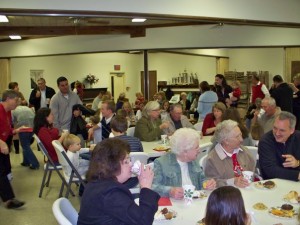And they devoted themselves to the apostles’ teaching and the fellowship, to the breaking of bread and the prayers. (Acts 2:42)
 To be the church, we must, after receiving the gospel and the Holy Spirit, devote ourselves to the fellowship. Fellowship is what folks are longing for when they say things like, “I just don’t feel connected at church.”
To be the church, we must, after receiving the gospel and the Holy Spirit, devote ourselves to the fellowship. Fellowship is what folks are longing for when they say things like, “I just don’t feel connected at church.”
In this sermon, I hope to move us from a potluck-based concept of fellowship to a gospel/Holy Spirit-based devotion to fellowship. We’ll consider the Biblical concept of fellowship in three stages:
- Requirements
- Realization
- Response
Requirements
First and foremost, we “were called into the fellowship of…Jesus Christ our Lord” (1 Corinthians 1:9). This is the basis and foundation for all Christian fellowship. 2 Peter 1:3-4 says,
His divine power has granted to us all things that pertain to life and godliness, through the knowledge of him who called us to his own glory and excellence,by which he has granted to us his precious and very great promises, so that through them you may become partakers of the divine nature, having escaped from the corruption that is in the world because of sinful desire.
The root for the Greek word translated “partakers” is the same as the one translated “fellowship” in Acts 2:42. We are partakers in Christ’s divine nature and thus enabled to be partakers in one another in true Christian fellowship. This is why John writes that he must proclaim the gospel if fellowship is to be possible.: “That which we have seen and heard we proclaim to you, so that you too may have fellowship with us” (1 John 1:3).
To enjoy fellowship with one another within the church, we must individually live in fellowship with God through Jesus Christ. This is more than detached observation or mere knowledge of God. This is partaking of and sharing with in him (1 Corinthians 10:16). This is walking him, “rooted and built up in him” (Colossians 2:6-7).
Secondly, to experience true Christian fellowship, we must be partnered in the gospel, meaning we must be working toward the same goals based on the gospel. This is the idea Paul expressed as rejoiced over the Philippian believers because of their “partnership” (from same root word as “partakers” in 2 Peter 1:3-4 and “fellowship” in Acts 2:42) in the gospel.
Without foundational fellowship with God through Jesus and the shared aim of gospel-fueled co-believers, attempts at fellowship will often feel forced and strangely empty.
Realization
Here is a fact that might surprise you: If you are a Christian (meaning you trust and follow Jesus Christ), you are already in fellowship with every other Christian across the globe. This is an objective fact. It’s just true. Romans 12:5 says, “…so we, though many, are one body in Christ.” It’s not that we should be one body in Christ. It’s that we are one body in Christ.
Living in disconnection with our brothers and sisters in Christ is contrary to reality itself. If you shattered your wrist, your other body parts would be affected. They would have to pull extra duty to enable the body to counteract the pain and disability. It’s the same within the body of Christ. One member suffers or succeeds, all members feel it.
Devoting ourselves to the fellowship is leaning into the fact that we are already “members of one another.”
Response
Based on the example set forth in Acts 2;42-47, Here are some practical ways we can devote ourselves to the fellowship:
- Be together often. This means spending time together, both in the church and outside of church.
- Be aggressively generous with one another. This means giving our resourced to one another as we have needs.
- Praise together. Intentionally share what God is doing in your life with your brothers and sisters, and ask them to do the same.





